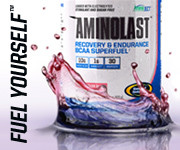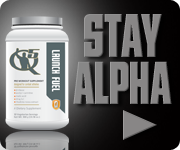
The Journal of Sports Science and Medicine published a new study that shows fish oil supplementation can reduce the inflammation and muscle soreness associated with intense exercise.
When you overwork your muscles rolling or weight training they can become inflamed. This inflammation causes a large part of the soreness you feel the next day. (Soreness that you don’t feel till later or the next day is called delayed onset muscle soreness, and is the type of soreness that the study looked at.) Taking Fish oil supplements can help prevent or reduce this soreness.
Fish oil contains Omega-3 fatty acids are essential to our bodies but we seldom get enough from our diets. These Omega-3 fatty acids are the raw materials we need to create prostaglandins. Prostaglandins act like powerful hormones to reduce inflammation and improve blood flow. They can also limit your sensitivity to pain and decrease swelling.[1] There are some other benefits for Jiu-Jitsu fighters who take Omega-3 supplements or fish oil. Omega-3 fatty acids have anabolic properties[2], and may even improve grip strength in older grapplers[3]!
The participants in the study took 3,000 mg/d of omega-3 supplementation for 7 days and then performed exercises. Researchers looked at post exercise soreness, swelling and skin temperature to determine the effects of the supplementation vs. the same exercise without supplementation. They found a 15% decrease in muscle soreness after taking the omega-3.
The study did not include a placebo group so further research needs to be done, but the results make sense given what we know about the anti-inflammatory properties of omega-3s.
If you are supplementing with fish oil make sure to use a reputable manufacturer to avoid potential pollutants. Keep dosages below 3,000 mg/d as larger doses may lead to increased bleeding time.[4] You’ll also want to keep your ratio of EPA/DHA at 2:1.
- Bill Thomas
[1] Maroon, J. and Bost, J. (2006a) Fish oil: The natural anti-inflammatory. Basic Health Publications, Inc. Laguna Beach. CA.
[2] Smith, G.I., Atherton, P., Reeds, D.N., Mohammed, B.S., Rankin, D., Rennie, M.J. and Mittendorfer, B. (2011) Omega 3 polyunsaturated fatty acids augment the muscle protein anabolic response to hyperaminoacidemia-hyperinsulinemia in healthy young and middle aged men and women. Clinical Science (London) 121, 267-278
[3] Robinson, S.M., Jameson, K.A., Batelaan, S.F., Martin, H.J., Syddall, H.E., Dennison, E.M., Cooper, C. and Sayer, A.A. (2008) Diet and its relationship with grip strength in community-dwelling older men and women: the Hertfordshire cohort study. Journal of the American Geriatrics Society 556, 84-90.
[4] Food and Drug Administration. (2004) 21 CFR Part 184 [Docket No. 1999P-5332]. Federal Register 69, 2313-2317.





